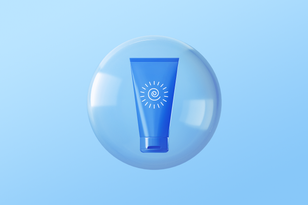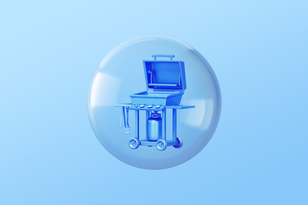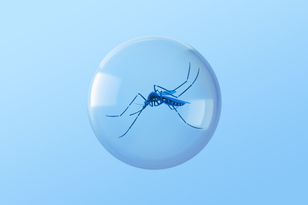Episode transcript
CHRISTINE: I’m Christine Cyr Clisset.
CAIRA: I’m Caira Blackwell.
ROSIE: I’m Rosie Guerin, and you’re listening to The Wirecutter Show.
CAIRA: Today’s episode is called: Seasonal Allergies Are Getting Worse
ROSIE: Today we’re doing a quick bonus episode on something many people are currently struggling with: It’s been a rough spring for seasonal allergies, and I feel like a broken record because I keep saying that year after year after year. But because of climate change, allergy seasons are becoming longer and they really are becoming more intense.
One in four adults in the US suffer from allergies. It’s definitely on a lot of people’s minds right now. I’ve been struggling with seasonal allergies for most of my life since I was a very, very young kid. There’s this juxtaposition that you’re excited for spring, and you’re really looking forward to the energy of longer days, the blooms of the flowers, but it’s tough not to feel well.
CHRISTINE: That’s right. If you believe that you have to pay for things, like maybe you’re having to pay for the beauty outside.
ROSIE: Karmically.
CHRISTINE: Yeah. Karmically, you’re paying for it.
ROSIE: It’s not right.
CHRISTINE: Caira and I are going to speak with one of our colleagues from The New York Times who’s been reporting about what to do if you have seasonal allergies. Nina Agrawal, a Health Reporter at The Times, is joining us to talk about how to determine if you’re suffering from allergies or something else, what you should know about different medications, and some of the other strategies you can use to combat seasonal allergies.
CAIRA: Yeah. We’ll also talk about what Wirecutter recommends for helping reduce the pollen in your own home. And even if you can’t control the pollen swarming around outside, you can do some things to improve your indoor air quality. So we’re going to take a quick break and then we’ll be here with Nina. Be right back.
CHRISTINE: Nina, welcome to the show.
NINA: Hi. Thanks for having me.
CHRISTINE: It’s great to have you. So a lot of people are struggling right now. It’s allergy season. We’ve been in allergy season for a little while now. This can really span from spring to the end of summer at this point, and it does seem like allergy season is just getting worse year after year. Is that just my imagination or is that true?
NINA: No, there is actually data to show that the allergy seasons are getting longer and the pollen counts are increasing, and they have been over time. So global warming has caused the season to start about 20 days earlier than it used to.
CAIRA: Yikes.
NINA: And pollen concentrations have risen about 20% nationwide since 1990. Texas and the Midwest have seen the greatest increases.
CAIRA: But why is that?
NINA: I think that with global warming, it means that the plants are able to flourish earlier in the season and flourish later in the year as well. And also, they’re able to grow bigger and produce more pollen per plant.
CHRISTINE: So that’s almost a month more of allergy season that’s happening.
NINA: Yeah. And so, when I spoke to physicians about this, some have been treating allergies for a long time, and they said that … One of the physicians I spoke to who has been treating patients for 40 years said when he started, there were kind of these three discrete allergy seasons: eight weeks in the spring, eight weeks in the summer, and eight weeks in the fall, and you would get a break in between. But now it’s kind of one long-running season.
CHRISTINE: Yeah.
CAIRA: I really do feel that. Sometimes it’s just hard these days to tell if maybe you have allergies, maybe you have a cold, maybe you have Covid. So how can somebody tell if they’re suffering from allergies or it’s something else?
NINA: So some of the symptoms are definitely overlapping, but the key thing with allergies often is itchiness: the eyes, nose, throat, mouth, ears even, itchy. Allergies can also cause congestion, post-nasal drip, coughing, wheezing, and shortness of breath. But if you have a viral infection, you might have muscle aches or joint aches or a fever that you wouldn’t have with allergies. And if you typically see symptoms around the same time every year, and if you have a family history or a history yourself of asthma or eczema, those could also be clues that you’re having allergies.
CHRISTINE: I always feel like I forget that I have allergies, and then it comes up again and it takes me a few days to remember, “Oh, this isn’t maybe a cold. It’s actually maybe allergies.” At which point I usually think, “Should I take a Claritin?” Should taking a medication be the first step if you think you’re having allergies?
NINA: I think it depends on how severe your symptoms are. But most of the experts I spoke with said first, try to manage your environment. You can just try to limit the exposure to pollen on really high pollen count days. There are trackers you can use to see how high the pollen levels are, so limit your exposure. Also, try to limit your exposure inside: keeping your windows closed, if you go outside on those high pollen days wearing a well-fitting mask, as soon as you get home, shower and change. Keep pets out of your bedroom or when they come into the home, wash them. And if you use a saline spray or a neti pot, that can also help a lot of people.
CAIRA: So listeners can also go back and listen to our second episode of the show about how to keep your indoor air quality clean. In that episode, we talk a lot about using an air purifier to reduce particulate matter and using a high-quality vacuum and other cleaning tools to just reduce dust, which can help reduce pollen in your home. So we will link to that episode in the show notes.
CHRISTINE: Nina, I know you did not come here today to give us medical advice, but I would like to talk a little bit about medication for allergies because you’ve done a lot of reporting on this. I kind of get confused by all of the different allergy medications. In one of your pieces, you break down the differences between nasal sprays, antihistamines, and decongestants. So I’m wondering if you could start with nasal sprays. What should people know about these when they’re dealing with allergies?
NINA: So nasal sprays like Flonase is one you might’ve heard of contain a type of steroid. They’re called corticosteroids, and these help reduce inflammation in the eyes, in the nose, in the throat. But for them to work, you have to start taking them a few days to a week or two before your symptoms hit so they can really kick in. So a lot of times people who are regular seasonal allergy sufferers, physicians recommend that they get their prescription or go and get their over-the-counter drugs and start using them a week or two ahead of when they typically begin to experience symptoms. And just a note that even though they’re steroids, they’re not absorbed systemically like an oral steroid would be, so they’re considered low risk.
CHRISTINE: Okay. So you can still do the Olympics and do nasal sprays.
NINA: I don’t know what the Olympic policy is, but I think so, yes.
CHRISTINE: Okay.
CAIRA: So what about that second one, the antihistamines? I think this is what a lot of people use during allergy season. What should people know about these?
NINA: For people who have moderate to severe allergies, doctors often recommend the nasal sprays. They tend to work really well. But if you’re somebody who is using a nasal spray and have breakout symptoms or it’s a really particularly bad day, or you just occasionally have allergies, sometimes the antihistamines can be enough, and they help manage the itchy symptoms. So that itchiness and inflammation is caused by histamine, a chemical that your immune system releases when triggered by an allergen, and these antihistamines can work kind of immediately or pretty quickly.
CAIRA: So you wouldn’t recommend that somebody take them on a daily basis?
NINA: I think you would have to talk to your doctor about what is the best. I know a lot of allergy sufferers do take them frequently. But sometimes you can manage it better if you have the steroid, like the nasal steroid, and then sometimes use the antihistamine as a backup.
CAIRA: Backup.
NINA: Yeah. Sometimes doctors say if you try one of these second generation antihistamines and it’s not working for you, try another.
CHRISTINE: And there are different generations of antihistamines, right? I think I read in one of your pieces that the second generation are things like Claritin, Zyrtec, Allegra. But then there’s this first generation of antihistamines, which is Benadryl. And you’re not necessarily supposed … There’s some problems with Benadryl, right?
NINA: Yeah. Obviously, it’s still available and I think widely used. But a lot of doctors, this was one of the surprising things I heard in my reporting, many doctors I spoke with really said they steer clear of Benadryl, especially in older patients because it can cause confusion and drowsiness. There’s been some research linking prolonged long-term use of Benadryl to an increased risk of dementia. But those studies weren’t causational, and we do know though that the use of Benadryl can be associated with increased confusion. And the second-generation antihistamines don’t do that as much.
CHRISTINE: Okay. Great. Well, what should people know about decongestants, that third category?
NINA: Yeah, so some antihistamines like Claritin D and Allegra D that come combined with pseudoephedrine, Sudafed, and doctors say they shouldn’t be used in kids at all. Adults if they do use them, should only use them for a few days at a time because they can increase heart rate and blood pressure.
CHRISTINE: Okay. So let’s say someone has tried these various medications, they’re just not getting relief. They’ve still got their runny nose and the itchy eyes, and they’re just miserable. What is another thing that they could do?
NINA: So ultimately, if you’ve tried limiting exposure in your environment and limiting your outdoor exposure and tried these various kind of shorter-term medications, you might be referred to an allergist, and you might have a talk about starting allergy shots. These are shots that allergists administer, starting with a very small dose and then going progressively higher to sort of increase the amount that you are able to tolerate. But they’re not something that’s going to give you relief tomorrow or this season. They take a number of years to work.
CHRISTINE: Years?
NINA: But they can have effects that last years as well.
CHRISTINE: Wow. So it’s a long-term investment in your allergy relief.
NINA: Yeah.
CHRISTINE: Okay.
CAIRA: Nina Agrawal, Health Reporter at The Times, thank you so much for joining us today.
NINA: Thanks for having me.
CHRISTINE: Thanks, Nina.
Okay, Caira, we covered a lot in this episode.
CAIRA: Yes.
CHRISTINE: So I just want to briefly recap for listeners who are struggling with allergies right now, and they just kind of want an easy step-by-step how to approach this problem. So first line of defense, reduce your pollen exposure. So that could be wearing a mask outside, and then really thinking about your indoor air quality. When the pollen count is high, close your windows, take off your shoes and clothes when you come inside the house, probably wash your clothes, take a shower, and keep your home clean. You can use an air purifier to reduce particulate matter. Use a good vacuum cleaner and other tools to get the pollen off your furniture, off the floors, all of that good stuff.
The next step is to understand the differences between the different allergy medications. You’re of course going to want to talk to your doctor if you’re having really bad symptoms. We are not giving medical advice here, so you should consult your doctor. The main categories of medications are nasal sprays, the kind with corticosteroids in them, antihistamines, and those you’ll want to use second-generation antihistamines like Zyrtec, Claritin, and Allegra. Use the decongestants like Claritin D and Allegra D sparingly. You don’t want to use those every day. And if you can’t get relief, that is the time to talk to an allergist. You may want to having immunotherapy like allergy shots.
CAIRA: If you want to find out more about Wirecutter’s coverage go to nytimes.com/wirecutter or find a link in the show notes. That’s it for us. Till next week, thank you so much for listening. Bye.
CHRISTINE: Bye.
The Wirecutter Show is executive produced by Rosie Guerin and produced by Abigail Keel, engineering support from Maddy Masiello and Nick Pittman. Today’s episode was mixed by Sophia Lanman. Original music by Dan Powell, Marion Lozano, Elisheba Ittoop, and Diane Wong. Wirecutter’s Deputy Publisher and General manager is Cliff Levy. Ben Frumin is Wirecutter’s Editor-in-Chief. I’m Christine Cyr Clisset.
CAIRA: I’m Caira Blackwell.
ROSIE: And I’m Rosie Guerin. Thanks for listening.
Credits
The Wirecutter Show is executive produced by Rosie Guerin and produced by Abigail Keel.
Editing by Abigail Keel.
Engineering support from Maddy Masiello and Nick Pitman.
This episode was mixed by Sophia Lanman.
Original music by Dan Powell, Marion Lozano, Elisheba Ittoop, and Diane Wong.
Wirecutter’s deputy publisher and general manager is Cliff Levy.
Ben Frumin is Wirecutter’s editor-in-chief.
Hosted by Caira Blackwell and Christine Cyr Clisset.

















